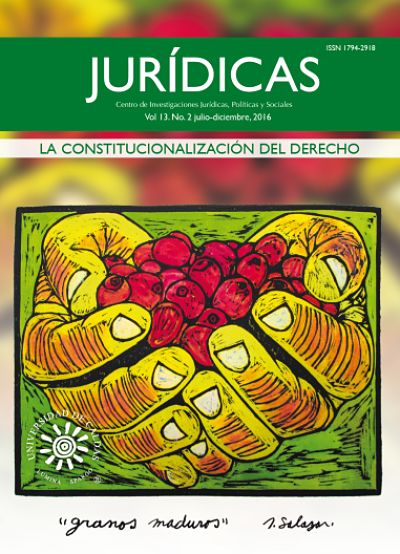Authors
Abstract
Supporters of the substantive rule of law state that the concept is compatible with the demands of the formal notion of the rule of law. Indeed, they affirm that those demands represent the basis upon which the substantive concept is built. Basically, those formalities demand that the law must be able to: (a) effectively limit the discretion of public authorities and (b) guide the decision-making processes of citizens. However, elements of the substantive notion of the rule of law, such as the existence of bills of rights directly enforceable by courts, create tensions with the imperatives of legality. This is particularly true concerning judicial discretion. In this context, the author concludes that those who support the substantive notion of the rule of law must either: (a) rethink the concept seeking mechanisms to alleviate the identified tensions within the concept, or (b) build the notion upon different grounds.
References
Allan, T.R.S. (2013). The Sovereignty of Law. Freedom, Constitution and Common Law. Oxford, England: Oxford University Press.
Allan, J. (2000). Oh that I were made judge in the land. Federal Law Review, 30 (3), 561-576.
Allan, J. (2011). Reasonable Disagreement and the Diminution of Democracy: Joseph’s Morally Laden Understanding of the rule of law. En Ekins, R. (Ed.). Modern challenges to the rule of law. Wellington, New Zealand: Lexis Nexis.
Beatty, D.M. (2007). The ultimate rule of law. Oxford, England: Oxford University Press.
Bingham, T. (2011). The rule of law. London, England: Penguin Books.
Craig, P. (1997). Formal and substantive conceptions of the rule of law: An analytical framework. Public Law, 467, 1-15.
Charlow, R. (2014). American constitutional analysis and a substantive understanding of the rule of law. En Silkenat, J.R., Hickey, J.E. and Barenboim, P.D. (Ed.). The legal doctrines of the rule of law and the legal state (Rechtsstaat). Heidelberg, Germany: Springer.
Dicey, A.V. (1982). Introduction to the study of the law and the constitution. Indiana, USA: Liberty Fund.
Dworkin, R. (1985). Political judges and the rule of law. A matter of principle. Cambridge, Massachusetts, USA: Harvard University Press.
Finnis, J. (2011). Natural law and natural rights. Oxford, England: Oxford University Press.
George, R. (2001). Reason, freedom, and the rule of law: Their significance in the natural law tradition. American Journal of Jurisprudence, 46, 249-314.
Goldsworhty, J. (2001). Legislative sovereignty and the rule of law. En Campbell, T., Ewing, K. and Tomkins, A. (Ed.). Sceptical essays on human rights. Oxford, England: Oxford University Press.
Heydon, J.D. (2014). Are bills of rights necessary in common law systems? Law Quarterly Review, 130, 2-53.
Jestaedt, M. (2012). The doctrine of balancing–Its strengths and weaknesses. En Klatt, M. (Ed.). Institutionalized reason: The jurisprudence of Robert Alexy. Oxford, England: Oxford University Press.
Joseph, P.A. (2011). The rule of law: foundational norm. En: Ekins, R. (Ed.). Modern challenges to the rule of law. Wellington, New Zealand: Lexis Nexis.
Jowell, J. (2015). The rule of law: A practical and universal concept. En Jowell, J., Thomas, C. and van Zyl Smit, J. (Ed.). Rule of law symposium 2014. The importance of the rule of law in promoting development. Singapore, Singapore: Bingham Centre for the Rule of Law y Singapore Academy of Law.
Moens, G. (1994). The wrongs of a constitutional entrenched bill of rights. En Stephenson, M.A and Turner, C. (Ed.). Australia: Republic or monarchy? Legal and constitutional issues. Brisbane, Australia: University of Queensland.
Raz, J. (2012). The rule of law and its virtue. The authority of law. Oxford, England: Oxford University Press.
Shklar, J.N. (1987). Political theory and the rule of law. En Hutchenson, A.C. and Monahan, P. (Ed.). The rule of law: Ideal or ideology? Toronto, Canada: Carswell.
Summers, R.S. (1998). The principles of the rule of law. Notre Dame Law Review, 74, 1691-1792.
Sunstein, C.R. (1996). Legal reasoning and political conflict. Cambridge, Massachusetts, USA: Harvard University Press.
Tamanaha, B. (2004). On the rule of law. History, politics, theory. Cambridge, USA: Cambridge University Press.
Urbina, F.J. (2012). A critique of proportionality. American Journal of Jurisprudence, 57 (1), 49-80.
Waldron, J. (1999). Law and disagreement. Oxford, England: Oxford University Press.
Waldron, J. (2011). The rule of law and the importance of procedure. En Fleming, J.E. (Ed.). Getting to the rule of law. New York: New York University Press.
Webber, G. (2009). The negotiable constitution. On the limits of rights. Cambridge, USA: Cambridge University Press.
Webber, G. (2013). Rights and the rule of law in the balance. Law Quarterly Review, 129, 399-419.
Yowell, P. (2012). Legislación, Common law y la virtud de la claridad. Revista Chilena de Derecho, 39 (2), 481-512.
Zimmermann, A. (2007). The rule of law as a culture of legality: Legal and extra-legal elements for the realization of the rule of law in society. Murdoch University Law Review, 14, 10-31.

 PDF (Español)
PDF (Español)
 FLIP
FLIP


























